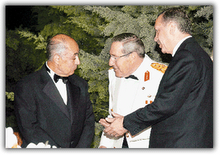Bloomberg'ün haberi: "Erdoğan'ın halk oyunu kazanmasından sonra Türkler yeni bir döneme giriyor"
24 Temmuz 2007
Turks Enter `New Era' After Erdogan Wins Popular Vote
Mark Bentley
Prime Minister Recep Tayyip Erdogan's election victory cracked the foundation of Turkey's 84-year-old republic, pushing Islam into the political mainstream and reshaping the legacy of the country's father figure, Mustafa Kemal Ataturk.
Erdogan's win two days ago, with the biggest share of the vote since 1969, may give him a mandate to lift some of the curbs on Islam, including the Muslim headscarf, which were the basis for the formation of modern Turkey in 1923. Turkey's military, which has ousted four governments since 1960, opposes such moves.
``It's a new era for the country,'' said Barry Rubin, editor of the journal Turkish Studies and head of the Global Research in International Affairs Center in Herzliya, Israel. ``The big question is how far they want to go. Some people believe they want to go all the way to Islamism, some believe they'll stop well short.''
In his victory speech, Erdogan, 53, promised to expand democratic rights, while pledging to seek consensus with the secular establishment, led by military commanders, over Islam's role in society. His Justice and Development Party captured constituencies all across the country, leaving only isolated pockets to the secularist parties.
Justice won 47 percent of the vote, a ``watershed'' that shows the rules laid down by Ataturk to forge Turkey from the ashes of the Ottoman Empire need to be modernized, said Suat Kiniklioglu, one of about two dozen advocates for broader democracy drafted by Erdogan to run for parliament to appeal to a greater range of voters.
Ataturk's Principles
``The electorate has shown that Ataturk and his principles are outside the scope of daily politics and should be left there,'' Kiniklioglu said. ``Ataturk never meant his views to be applied blindly and to be abused.''
Former officers, whose views generally reflect those of the military establishment, said they recognize the significance of the victory and indicated the army may keep a low profile for now.
``They won the game,'' said Riza Kucukoglu, a former major general. ``We now have to give them credit and observe whether Justice will play according to Ataturk's rules.''
The military, backed by Turkey's secularist parties and many of its urban elites, has seen Erdogan's promotion of Muslim values as a threat to the nation's identity as democratic and strictly secular.
Mindful of Justice's growing appeal, army generals swapped tanks for the Internet on April 27 to direct a political attack on Erdogan after he nominated Foreign Minister Abdullah Gul, a pious Muslim and longtime confidant, as Turkey's next president.
Successful Appeal
The military's statement on its Web site prompted the main opposition Republican People's Party, founded by Ataturk, to begin a successful appeal at the Constitutional Court to cancel Gul's election by parliament on a technicality.
Meanwhile, Kucukoglu's group of retired officers organized street protests against Gul's candidacy attended by hundreds of thousands of followers of Ataturk's code. Erdogan called the parliamentary election a week later, saying the ballot would strengthen democracy.
The attempt by the generals to influence public opinion has back-fired after Erdogan's easy election win, said Erik Zurcher, a professor at Leiden University in the Netherlands and author of ``Turkey: a Modern History.''
``The army's hand has been weakened,'' Zurcher said in a telephone interview. ``Even having 500,000 people on the streets doesn't mean anything now.''
Military Service
The Turkish army, the second-largest in the North Atlantic Treaty Organization, still has considerable influence through pro-Ataturk civilian groups, compulsory military service and partnerships between its pension fund and foreign companies including French carmaker Renault SA.
The army has questioned whether Erdogan is fit to rule the country by pointing to his party's Islamist origins. Justice and Development is rooted in an Islamist movement ousted from government in 1997 by a military-led public campaign. The group was outlawed a year later for mixing religion with politics.
In his victory speech, Erdogan said Justice now represents Turkey's political mainstream and will boost democracy without threatening secular principles. Erdogan is backed by many of Turkey's business leaders, who have benefited from five years of economic growth.
EU Talks
Justice and Development has traditionally drawn its support from conservative families in Turkey's villages and shanty towns. The party has since strengthened its legitimacy among the middle classes by attracting record foreign capital and winning European Union membership talks on a platform of promoting Turkey as Muslim and democratic.
Justice's victory ``shows that the `them and us' distinction'' between secularists and the Islamic political movement has been eliminated, Guler Sabanci, chairwoman of Haci Omer Sabanci Holding AS, said in an e-mailed response to questions.
Erdogan may use the strengthened mandate he won to challenge the military again by backing a fresh bid by Gul for president. Erdogan hasn't said whether he will nominate Gul, 56, in a new election by parliament.
``Abdullah Gul's thoughts and intentions will be extremely important for me,'' Erdogan told reporters in Ankara yesterday.
The Grand National Assembly, which now represents a wider section of Turkish society after nationalists and pro-Kurdish candidates won seats to join the Republicans in opposition, is due to reconvene next month for the new presidential election.
Justice will need the support of the opposition to convene the assembly for the election. The party has 340 seats, 27 seats short of the two-thirds quorum required, according to preliminary results. The Republicans will have 112 seats, the Nationalists 71 and the independents, mostly pro-Kurdish deputies, 27 seats.
And Turkey's military won't be far away when deputies cast their votes -- the chiefs of the general staff are just across the road.


